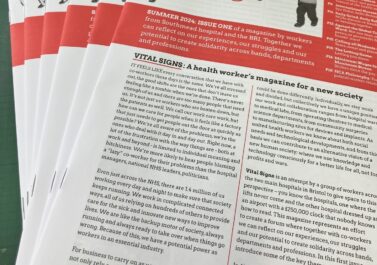Dear comrades,
we would like to propose some ideas for our upcoming Zoom calls. The first one will be on Tuesday, 31st of March at 7pm. Send us an email if you want to participate:
angryworkersworld@gmail.com
First of all, we will be happy to answer (outstanding) questions and comments regarding our recent book presentation. You can re-watch it here in case you have missed it:
https://www.facebook.com/angryworkersworld/videos/535561113644214/
https://www.facebook.com/angryworkersworld/videos/204943347433445/
We would like to go a step further though, and turn the whole thing into more of a discussion. We are keen to hear your thoughts on our organisational proposals.
1. The current crisis shows that the whole way we produce our lives has to be fundamentally changed. To do this we have to break the power of the owners of the means of production and the state. This can only be done from below, by the working class. Workers in the essential industries (reproduction, food, energy, care, transport, health, communication, machine manufacturing etc.) will be especially important. Self-organisation by the working class has to go through a collective learning process – through actual day to day struggles. Within these struggles we have to overcome boundaries and divisions set by the current system (companies, households, professions, racism, national borders). A political working class organisation has to act and grow within these struggles, help connecting their advanced points.
2. As working class revolutionaries we have to organise ourselves strategically within the class. Our basic proposals for small groups, here and now are:
a) To set up a solidarity network in a working class area, in particular close to bigger workplaces;
b) Get a job in a bigger local workplace, or organise around it, chosen according to the following questions: is the workplace significant beyond its immediate reach, e.g. part of a wider supply-chain? are new dynamics within the workplace likely, e.g. because of young, (migrant) workforce; will the wider question of reproduction be raised due to larger share of female workers? are workers producing a new or essential product/service? Learn and establish a workplace group;
c) Set up a local workers’ publication, reflecting on the solidarity network and workplace experiences, as well as international struggle news and more ‘political’ articles.
d) Develop a political collective, through e.g. reading groups, where the theoretical debate is in relation with both, day to day questions and wider social issues; exchange your local experiences and debate within a wider organisational process; this could mean to write regular local reports, attend regular national and international meetings; have a commitment and willingness to discuss the local practice within a wider strategy.
What do you think are the limitations and upsides to these proposals?



